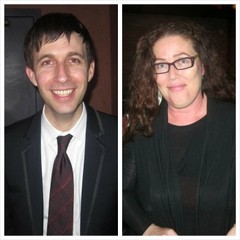|
Back
Adventures Into The Unknown New York
SubCulture, 45 Bleecker Street
03/10/2014 -
Oliver Knussen: Variations, Opus 24
Luciano Berio: Cinque variazioni
Tamar Muskal: Frédéric Variations (World Premiere)
Frederic Rzewski: 36 Variations on “The People United will Never Be Defeated”
Benjamin Hochman (Pianist)

B. Hochman, T. Muskal (© Coco T. Dog)
Benjamin Hochman is one very brave piano player. The Israeli-American artist has made his reputation with Brahms, Schubert, Mendelssohn...the Establishment. But last night, in a program entitled “Variations”, he eschewed those Establishment variation-makers (Brahms, Mendelssohn etc) and plunged into difficult 20th and 21st Century variations, composed by agonizingly difficult composers.
Had this been Avery Fisher Hall–where uninhibited antediluvian coughers and sneezers were out in force for Murray Perahia’s Beethoven on Sunday–Mr. Hochman wouldn’t have had a chance. But SubCulture (in association with the 92St Y) attracts an audience of young and old, whose only commonality is respect for the artist. Not a sniffle or a cough was to found, not even during the hour-long variations in the second half.
As for Mr. Hochman, he is a dashing technician. No piece was played by memory, but that was a wise choice. The first two works, by Knussen and Berio, were highly complex, the third, by Israeli composer Tamar Muskal, was a world premiere, and the last by Frederic Rzewski, needs a full score for its 36 variations.
The latter has been performed here before, but never in the usual concert hall. BargeMusic was the last venue, with a smooth exciting performance. It was a technically perfect performance, with all the Busoni-style, bluesy, and anthem-quoting variations played with full force.
One essential element was missing. One feels that Mr. Rzewski, a composer for “The People, Yes” (thank you, Mr. Sandburg) was in a workingman’s bar, and the Chilean revolutionary song was being improvised–as Mr. Rzewski could have easily done. The “People United” Variations might have been notated later by the composer. Yet the secret is to play this without trying, as if enthusiasm should have trumped artistry.
Mr. Hochman was the artist, the technician, the excellent piano player (even if his whistling parts were spiritless). Rzewski, though needs somebody who has thrown away the score and plays this as if it’s the first time, as if each improvisation has been acclaimed spontaneously, that Rzewski was simply enjoying himself , with the same enjoyment as his hard-drinking audience of Chilean workers.
Rzewski, though, is a singular case. In fact, he is probably the only pianist who can ideally offer that inconceivable aura of abandon and commitment.
The two first variation works, new to me, were hardly as accessible to the naked ear as the Rzewski. Oliver Knussen, though always a complex but happily tonal composer, had a series of short variation (or variations within a variation on his first notes) that were indeed given that improvisatory feeling which was missing in the Rzewski. Mr. Hochman has a smooth finespun tone, and he managed Knussen’s extremes of the register, and delightful variations with his usual aplomb.
As one of those Philistines who loves Luciano Berio’s Sinfonia, Folk Songs and remakes of Schubert and Puccini, I’ve never been able to get hold of his atonal pieces. His Five Variations was Berio at the beginning of his career, a terrific serial-music engineer, an advanced prodigy with Darmstadt/Boulez equations, but the piece didn’t really ring any bells for me. I suppose Mr. Hochman played it quite brilliantly, but have nothing with which to compare it.
Onto the most impressive work on the program. Tamar Muskal, like Mr. Hochman an Israeli-American, was in the audience for her world premiere. Hers was a new name to me, but her variations, based on the Chopin posthumous A-Flat Major Etude was structurally and musically the most interesting work last night. It was endearing on a multiplicity of levels.
Mr. Hochman started with Chopin’s original gentle piece (albeit with a few harmonic changes), and, without a pause, Ms. Muskal began a fascinating transmogrification. At the start, she deconstructed the Chopin. Like Picasso, she placed head and body in different positions, giving awkward (but never unpleasant) the shadows beneath the triplets. As the work continued, she got further and further away, yet somehow preserving both the sprightly feeling of the Chopin. Or–most intriguingly–giving flashbacks, virtually subliminal echoes from the original.
One felt as if in an mysterious cave with brief flashes of light, before chasing the music into the most remote partitions of her cavern. And just as we were becoming lost in the blackness, suddenly, the Chopin original popped up in its original form again.
Or seemingly original form. No happy ending for Ms., Muskal’s work. It stopped in the middle. And we were left breathless.
Like the whole work, it was unexpected, adventurous, it verged on the cusp of Chopin reminiscence and creative arcana. And Mr. Hochman, with an obvious adoration, played it with both agility and affection.
Harry Rolnick
|